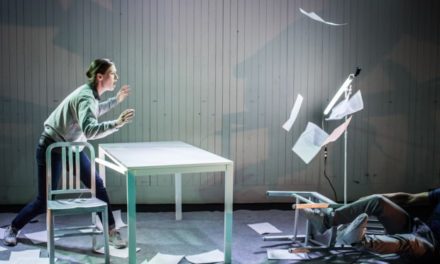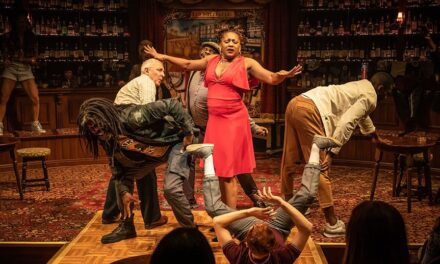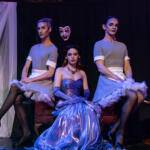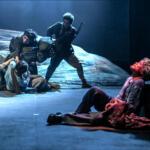In my humble view, Tiago Rodrigues is one of the most important theatre makers at work today. His is a theatre that asks profound questions about what we value and why, and what we are prepared to do to protect it. It is a theatre that engages with what it means to be human without ever simplifying the complexities of a world where climate emergencies, global conflicts, forced migration and exile, and technological innovations are reconfiguring understandings of how we relate to each other, communicate and make sense of the pasts we inherit. Rodrigues makes theatre about people that are so often forgotten or sidelined: a theatre of the neglected. His is a resolutely multilingual theatre where actors speak across different linguistic (as well as theatrical) registers. Global cities are often distinguished by a plethora of languages that can be heard on its streets. Global theatre-makers too often resort to a monolingual theatre. Rodrigues, as writer-director and actor, is unafraid to have languages rub against each other in ways that feel refreshingly real; his is a theatre that feels lived in, without ever appearing complacent.
Rodrigues, working with his artistic collaborator Magda Bizarro, makes theatre that is unafraid of grappling with difficult issues. His documentary theatre piece, As Far as Impossible (2022), centres on the experiences of humanitarian aid workers, crafted from interviews conducted with those working from the International Red Cross and Doctors Without Borders; their tales providing a picture of stories that too often remain untold. His approach to the classics has been similarly bold: Antony and Cleopatra (2014) was re-envisaged for a cast of two, engaging with the play’s motifs and stage history in ways that felt lithe and dynamic. In Sopro (2018), he presented the history of a theatre through the memory of its prompter — a piece Chekhovian in its poignancy that placed a figure at the margins of theatre-making centre stage. In By Heart (2013), probably my favourite piece of theatre of the past decade, Rodrigues works with a group of ten audience members as he teaches them Shakespeare’s “Sonnet 30”. The journey is interwoven with tales of how Boris Pasternak’s translation of the poem worked to defy the clutches of Stalin’s control of culture, his grandmother’s relationship with Shakespeare’s sonnets, and the role of memory in preserving endangered literature.
Book burning of course has reared its ugly head in recent times — arguably, did it ever go away? The American Library Association’s Office for Intellectual Freedom (OIF) reported a 92% increase in the number of titles which were targeted for censorship in 2023 — the data clearly aligned to the rise of a highly conservative Republican right. The inroads made by the right and the ways in which its toxic messages have seeped into contemporary society are deftly examined by Rodrigues in Catarina e a beleza de matar fascistas (Catarina and the Beauty of Killing Fascists). The piece is a compelling family drama set in the not-so-distant future of 2028, which slyly deconstructs Brecht’s model for political drama. It is done so adroitly that you don’t quite realise what has happened until it is all over. And this is what makes it so effective and so devastating as a piece of political theatre. Spoiler alert (should you need it): this isn’t a play with a happy or cathartic ending.
At the play’s opening, an extended family gather in their summer country house in Baleizão, an idyllic rural location far from Lisbon in southern Portugal. They have a proud working-class history but have slipped into a comfortable middle-class existence of nostalgia for a past that they have too easily romanticised. The grandfather (António Fonseca) looks slightly out of sorts. His daughter (Isabel Abreu) is not to be messed with, a crusading socialist with an unshakeable sense of purpose. Her brothers romanticise the cuisine of their departed mother – one of them (António Parra) having cooked one of her signature dishes, pigs’ trotters for the family gathering — much to the disgust of one of the younger generation (Carolina Passos Sousa), a vegan who is subject to the affectionate banter of her exuberant uncles. There’s a relaxed atmosphere: family members finish each other’s sentences, pour each other wine and appear in celebratory mood. Rodrigues lets the family dynamics unfold over the play’s opening scenes – much as in Uncle Vanya or Michael Cimino’s 1978 film The Deer Hunter. The easy mood, however, is about to be blown apart: for the audience soon discover that this is a family that comes together each year to kill a fascist, a ritual that has been played out for the past seven decades. This year it is the turn of the youngest daughter (a coolly defiant Beatriz Maia) to experience the family rite of passage and kill her first fascist.

Family discussions: Marco Mendonça and António Fonseca in Catarina and the Beauty of Killing Fascists. Photo: Joseph Banderet, courtesy of the Tampereen Teatterikesä
This is the dilemma that plays out for much of the production as this new generation of the family refuses to accept the family tradition. Catarina daughter questions the destiny that has been laid out for her – much to the annoyance of her inflexible mother. All family members act in the name of Catarina Eufémia, a peasant woman assassinated in 1954 for trying to secure workers’ rights. In the absence of a just punishment for her assassins, the family continue the tradition of vigilante justice, perpetrated by a now dead female relative who avenged her friend Catarina at a time when no man was prepared to do so. As in The Oresteia, blood here begets blood. All family members refer to each other as Catarina, and all remain convinced that justice is on their side. Difference or nuance are not permitted here; there is simply an insistence that they must act together to rid Portugal of a fascist each year. The youngest Catarina must now be initiated, mafia-like, into the unspoken family business.
Catarina and the Beauty of Killing Fascists is a shrewd exploration of the boundaries of what can be justified in the name of anti-fascism. Can extra-judicial violence be warranted to confront fascism? Can undemocratic means be used to defend democracy? What happens when the law is complicit with the far right — as with the case of the misogynist, homophobic judge, Neto de Moura? The family debate the different ideological positions with humour and fervour. Brecht is invoked repeatedly by the earnest socialists but this is no ordinary lehrstück, rather the argument for killing the silent fascist tied up in the chair in the centre of the stage is progressively questioned by the younger Catarina who posits a different approach to countering fascism. Her uncles may try to teach her to shoot but she resists. Her sister may want to take her place but this is not an option. There is panic as a mobile phone rings, and the family fear that Catarina daughter may not have followed the careful steps to ensure she was not followed. As her mother gets progressively drunker, her inflexibility comes to the fore. Catarina daughter is planning to return to Lisbon but her mother insists she return the jumper she had been borrowing. Will she sacrifice her daughter like Iphigenia if she refuses to comply? There is no compromise, no grey area for Catarina mother. She marches with a sense of purpose that will not accept a challenge. Her daughter on the other hand hopes that reason will prevail. But as the piece progresses, it becomes all too clear that neither her mother nor the fascist is interested in reasoned argument.
F. Ribeiro’s set across the wide stage of the TTT-Theatre (appropriately “the workers’ theatre”), presented as part of Tampere’s Theatre Festival, balances both open space and containment. Não passarão (they shall not pass) decorates the family tablecloth, a clear pointer to the intransigent position they take on fascism. The cosy rural wooden house is split apart as the piece progresses — much like the family. Its walls are each lined up across the stage in a picture of dismemberment. José António Tenente’s costumes have a folkloric feel — the benign appearance camouflaging a more ominous purpose. Pedro Costa’s sound, with the seductive tones of birdsong lull the audience into a sense of rural repose. The reference to the family as swallows is perhaps a nod to Ibsen’s Wild Duck. Music is deployed to effective purpose — the sound of mobile phones created by the actors then merging into Rosalia’s De plata.

Catarina daughter (Beatriz Maia) refusing to kill the fascist (Romeu Costa) while the extended family look on in “Catarina and the Beauty of Killing Fascists”. Photo: Joseph Banderet, courtesy of the Tampereen Teatterikesä
This is a piece rooted in the context of Portugal’s fascist past. The Carnation Revolution in 1974 brought democracy but what are the fault lines in this democracy and how has fascism established a contemporary presence? Or did fascism always remain in the shadows, albeit dormant, during the early years of the hedonistic democracy? The family displays the failures of the left — so exquisitely exposed also in Tony Kushner’s Angels in America: fractured by infighting and unwilling to compromise or work together to protect principles that are trampled over by the right. The cast of eight are uniformly excellent and refreshingly unshowy in what is a virtuosic ensemble piece.
Romeu Costa’s kidnapped fascist is largely silent for much of the piece. Dressed in a suit and tie with a trim moustache, he is visually differentiated from the family – all dressed in versions of the same rustic-patterned loose-fitting skirt, apron and shirt. His devastating monologue at the play’s end displays the moral quandary at the heart of the piece. The Catarinas haven’t killed him, so he remains alert and dangerous while the family watch him impassively: unable to move or act. He is left uncensored, spouting his vitriol unchecked. Hate pours out but through an effective appropriation of the language of the left. Freedom as a term — as Jair Bolsonaro so effectively demonstrated — is hijacked to repressive ends. Costa’s fascist sounds so reasonable, so affable in his opening remarks, and then the venom emerges, slowly but surely, and it builds to a crescendo: a disturbing rant of misogyny and homophobia all packaged within the language of protecting the nation, the traditions of Portugal, and the sanctity of the family. When assaulted with the rhetoric of Meloni, Milei, Bolsonaro, Farage or Abascal, any one of us can switch off the television, computer or radio. Here we are trapped in the auditorium, forced to listen to a hate speech for what seems like an eternity (actually about 15 minutes).
In this respect Catarina and the Beauty of Killing Fascists struck me as a companion piece to Piel de Lava’s most recent production, Parlamento. Voices in the auditorium ask the fascist to stop but he continues, convinced of his righteousness. This is the far right of the present: ubiquitous and unable to be switched off. This is what Rodrigues does so devastatingly in this extra-ordinary production. He encourages us to be the active critical audience member delineated by Brecht but similarly immerses us in the hate rhetoric of the right by trapping us in the auditorium.
Catarina and the Beauty of Killing Fascists exposes the limitations of the Brechtian model and its ideals in an era where the right operates both through the charismatic demagogue who appeals to the vulnerable with their seductive rhetoric, and through the social media channels where mobilisation can happen swiftly and ominously without clear accountancy. As critic Sanna Kangasniemi reports in the leading Finnish newspaper Helsingin Sanomat: “The influence is shattering when theatre lets the fascist speak”. In calling for the proposed cuts to theatre to be reviewed, the production is judged to be as “exactly the kind of theatre our democracy needs: it has weight, importance and it’s frighteningly timely”. Four years after it was first seen, the production is continuing to tour; its message arguably even more timely than when first presented in 2020. Tiago Rodrigues’ theatre invites us to sit up and take note without ever feeling didactic or propagandist. Catarina and the Beauty of Killing Fascists feels urgent and necessary.
Festival d’Avignon and Teatro Nacional D. Maria II production of Catarina and the Beauty of Killing Fascists played at the Tampere Theatre Festival on 10 August 2024. Future performances include: 23-24 August 2024, Noorderzon 2024 – Festival of Performing Arts & Society, Groningen; 13-17 November 2024, Brooklyn Academy of Music, New York (USA); 10-11 December 2024. Nicosia International Festival, Cyprus; 9-10 January 2025, Espace 1789, Saint-Ouen, France; 6-7 February 2025, Théâtre de la Croix-Rousse, in partnership with Théâtre du Point du Jour, Lyon, France; 11-14 February 2025, Théâtre Vidy-Lausanne, Lausanne, Switzerland; 20-21 February 2025, LAC – Lugano Arte e Cultura, Lugano, Switzerland; 19-21 March 2025, La Criée Théâtre National de Marseille, France.
This post was written by the author in their personal capacity.The opinions expressed in this article are the author’s own and do not reflect the view of The Theatre Times, their staff or collaborators.
This post was written by Maria Delgado.
The views expressed here belong to the author and do not necessarily reflect our views and opinions.


















